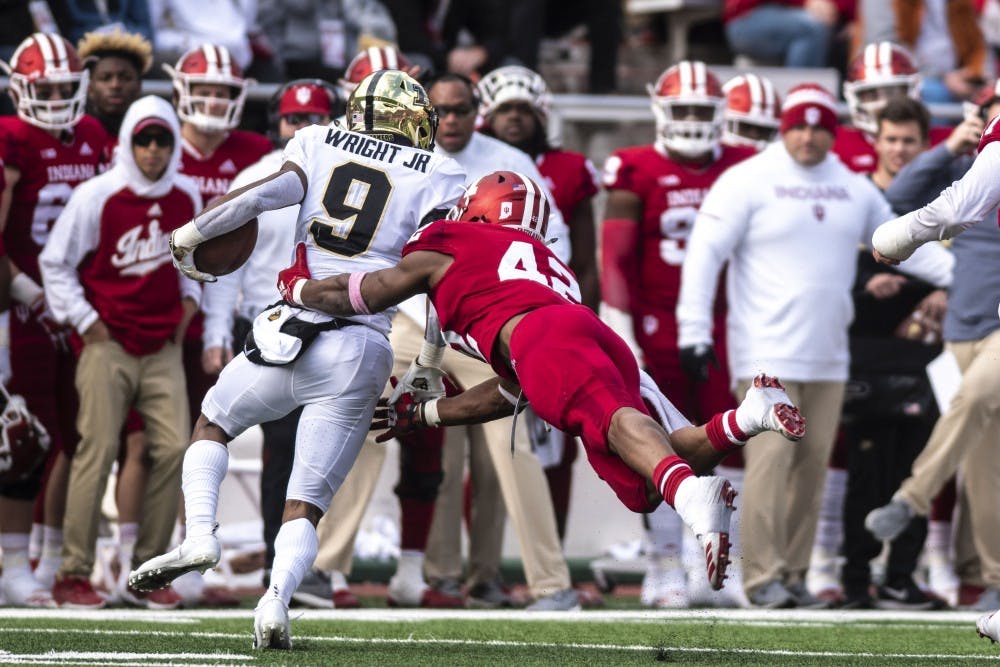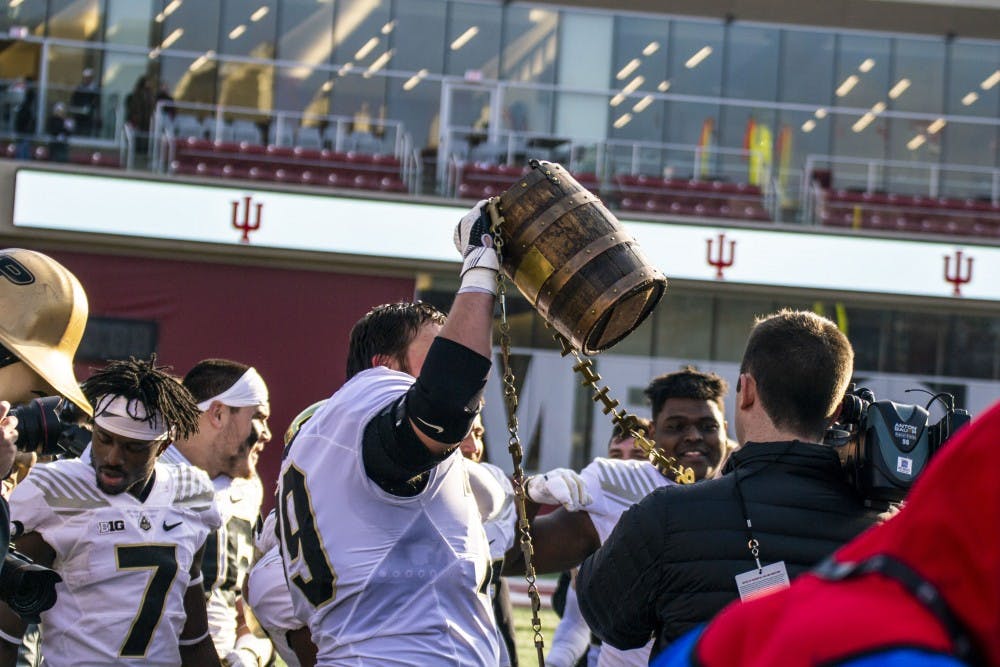For the second straight year, the battle for the Old Oaken Bucket was a must-win game for IU.
Just like last season, the Hoosiers finished their season with another disappointing performance, losing 28-21 to the Boilermakers, and finishing the season with a 5-7 record and no postseason appearance.
Thanks to a dominant game from Purdue freshman wide receiver Rondale Moore, Purdue was always a step ahead of IU in all facets of the game.
IU never had a lead and it took a late consolation touchdown pass from sophomore quarterback Peyton Ramsey to junior wide receiver Nick Westbrook just to make the contest appear close.
Here’s what you need to know from the final game of the 2018 IU football season.

1. The IU defense was powerless to stop Rondale Moore.
Coming into the game, everyone on both teams knew Moore would be the featured player in the Purdue offense. Despite this, he dominated the IU defense to the tune of 12 catches for 141 yards and two touchdowns. After a somewhat quiet first quarter, Moore exploded in the second period with three catches for 72 yards, highlighted by a 56-yard touchdown grab near the end of the half.
“He was a difference-maker for us today,” Purdue Coach Jeff Brohm said. “He’s a guy the quarterback looks to and if you get him one-on-one, he’s going to get the ball. He plays hard, he plays tough and he does all the small things right.”
When Purdue needed a big play, it looked to Moore and he provided. Along with his big touchdown catch in the second quarter, Moore also came up with a 33-yard score late in the third quarter, giving Purdue a two-touchdown lead. IU would never come back from that deficit, and Moore’s ability to make explosive plays made all the difference.
2. IU’s offense was ineffective for most of the day.
Before Saturday’s game, Purdue was ranked 99th out of 129 teams in total defense. The Boilermakers were conceding an average of 437 yards per game and even though that trend continued against IU, the Hoosier attack was largely inefficient. Ramsey’s final stat line of 345 passing yards and one touchdown may look gaudy at first glance, but 167 of those yards came in the fourth quarter, when IU had abandoned the running game in a search for quick scoring drives.
“They were stirring some things up and giving us different looks,” IU Coach Tom Allen said. “We had more yards than they did, but that doesn’t really matter. It’s about points.”
Points were something the Hoosiers were sorely lacking against a defensive unit that was one of the more porous in the Big Ten. The Purdue defense was giving up an average of 28 points per game, yet IU only managed to score 21 points, with seven of those coming near the end of the game.
It took nearly 20 minutes of game time for the Hoosiers to get on the board, and they fell silent again after freshman running back Stevie Scott’s touchdown with more than 10 minutes to play in the second quarter. IU didn’t score again until halfway through the final quarter, making its drought between scores 33 minutes and 19 seconds.

Despite scoring twice in six minutes late in the fourth quarter, those two long stretches had dealt too much damage to IU’s Old Oaken Bucket and bowl hopes.
3. The Hoosiers will miss a bowl game for the second straight year after another disappointing season.
Following IU’s 3-0 start, expectations were much higher than they were at the beginning of this season. Once Big Ten play started, things began to look like similar to seasons past. Close losses against conference opponents began to pile up, and once again, IU came into the Old Oaken Bucket game in need of a win to extend its season.
Instead of an inspired, hungry performance from a team fighting for its postseason life, the Hoosiers were uninspiring and lethargic on both sides of the ball. Defensive mistakes and penalties cost the defense again, and there simply wasn’t enough offense to give IU a chance to win.
“I just told out young men, if you did everything in your power to prepare yourself to play your best this week and you played your heart out for 60 minutes, you got nothing to be ashamed of,” Allen said. “But if you didn’t, you know that and you can’t change the past.”




